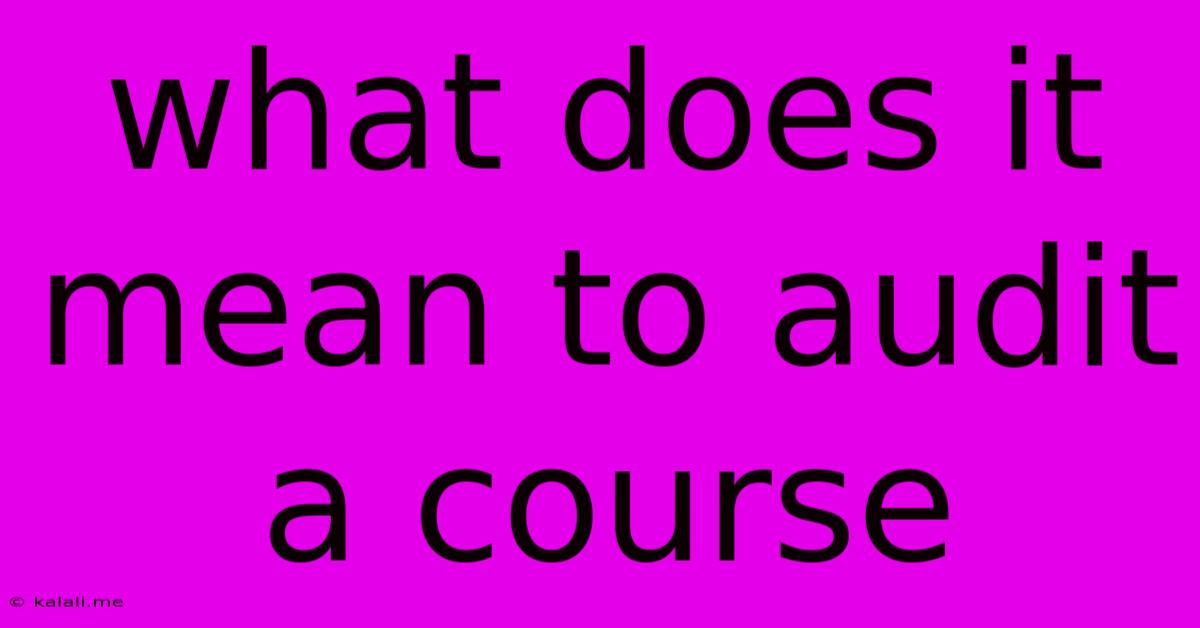What Does It Mean To Audit A Course
Kalali
May 20, 2025 · 3 min read

Table of Contents
What Does It Mean to Audit a Course? Unlocking the Power of Passive Learning
Want to explore a subject without the pressure of grades or official credit? Auditing a course might be the perfect solution. This article explores what auditing a course entails, its benefits, and how it differs from traditional enrollment. Understanding the nuances of course auditing can open doors to a wealth of knowledge and skill development.
What is a Course Audit?
A course audit is essentially a form of passive enrollment in a course. It allows you to attend lectures, access course materials (often with limitations), and participate in class discussions, but without the requirement to complete assignments, take exams, or receive a grade. You're essentially a "silent observer" with the ability to actively learn. Think of it as a deep dive into a topic, guided by an expert, without the stress of academic pressure. This makes it a valuable tool for personal and professional development.
Key Differences Between Auditing and Enrolling:
- Grading: Auditing eliminates the pressure of grades. You learn for the sake of learning, not for a letter on a transcript.
- Assignments and Exams: Auditors typically aren't required to complete assignments, homework, or take exams.
- Credit: Auditing doesn't grant academic credit. The knowledge gained is for personal enrichment, not toward a degree or certificate.
- Cost: The cost of auditing a course varies significantly depending on the institution. Some institutions offer free audits, while others may charge a reduced fee compared to full enrollment.
- Participation: While you can actively participate in class discussions, your contribution is not formally evaluated.
Benefits of Auditing a Course:
- Exploring New Interests: Audit a course to explore a subject before committing to a full program of study.
- Professional Development: Enhance your skills and knowledge relevant to your career without the time commitment of a full course.
- Supplementing Existing Knowledge: Deepen your understanding of a topic you're already familiar with.
- Networking: Connect with professors and fellow students, expanding your professional network.
- Flexibility: Enjoy the learning experience without the rigid structure and deadlines of a formal course.
How to Audit a Course:
The process of auditing a course differs based on the educational institution. Some institutions have a straightforward application process, while others might require contacting the department or instructor directly. Check the institution's website or contact the registrar's office for specific instructions. Be prepared to explain your reasons for auditing and confirm your understanding of the limitations involved. You may need to pay a reduced fee, or in some cases, it might be entirely free.
Who Should Audit a Course?
Auditing a course is a great option for a wide range of individuals:
- Professionals: Looking to upskill or stay current in their field.
- Lifelong Learners: Passionate about continuous learning and exploring new subjects.
- Students: Wanting to explore a subject before declaring a major or minor.
- Retired Individuals: Seeking intellectual stimulation and new challenges.
In Conclusion:
Auditing a course is a flexible and accessible way to expand your knowledge and skills without the commitment of formal enrollment. It offers a valuable opportunity for personal and professional growth, allowing you to delve into subjects of interest at your own pace. By understanding the process and benefits, you can unlock the power of passive learning and enrich your life through exploration.
Latest Posts
Latest Posts
-
How To Fill A Pond In
May 21, 2025
-
Cf Card To Sd Card Adapter
May 21, 2025
-
Will Allah Forgive Me For Marrying A Non Muslim
May 21, 2025
-
What Is My Grandads Brother To Me
May 21, 2025
-
Will A Diesel Car Run On Petrol
May 21, 2025
Related Post
Thank you for visiting our website which covers about What Does It Mean To Audit A Course . We hope the information provided has been useful to you. Feel free to contact us if you have any questions or need further assistance. See you next time and don't miss to bookmark.